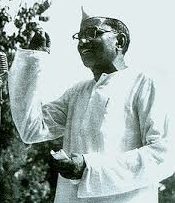BLENDING REALISM WITH IDEALISM
- By : Anirban Ganguly
- Category : Articles

Integrality defined Deendayal Upadhyaya’s life and work. A complex polymath, Upadhyaya straddled many worlds and dimensions. Rising from deep poverty, battling against odds, displaying a razor-sharp intellect, he made a lasting contribution to India’s political life
Discipline and a political philosophy which had been internalised and dynamically applied, were among the hallmarks of, as Pandit Deendayal Upadhyaya termed it, a ‘good party.’ But which is a good party, asked Upadhyaya. He discerned three characteristics — first a ‘good party’ was not “one that (is) simply a collection of individuals but is a body corporate with a distinctive purposeful existence, different from its desire to capture power”, second was the strong ‘devotion’ and ‘discipline’ of its workers. For Upadhyaya, “discipline is to a party what dharma is to a society.” A party with a strong sense of devotion and discipline among its workers would not be easily plagued with “groups and factions”, it was only “when party interests are subordinated to self interest” that factionalism began.
The third quality of a ‘good party’ for Upadhyaya was that it “should be wedded to certain ideals and all its policies should be framed with a view to realising these ideals”. Being the pragmatic practitioner, Upadhyaya recognised the difficulty that “the very practical act of administration cannot be fitted into a set of formulae framed on a theoretical analysis of the situation”. But expediency and opportunism should not pass for realism, he argued, “realism is a virtue of the idealist, the principled man, the missionary; it is not a characteristic of the man with an easy conscience, the opportunist and the apostate”.
Democracy for him was not simply about election, it required “a well-organised people, well-built parties and well-established convention of political behaviour”. Thus, a good party with a “good set of candidates” needs to also have a “realistic programme… It is after all the programme that will require to be implemented. Good people with a bad programme or an impractical programme will not help alleviate the sufferings of the people. On the contrary they will create more difficulties.” Under him, Upadhyaya tried to evolve the Jana Sangh, as he himself admitted, into a “well-knit, disciplined and devoted party” with the belief in the ultimate triumph of “firmness and righteousness.”
Pandit Upadhayay’s pragmatism was in sharp contrast to the wooliness of the public policies of the period. He cautioned against excessive philosophising and conservatism when he wrote, “We have set out with the determination to make this nation strong, happy and prosperous…and, therefore, we must carry on practical programmes for national reconstruction on this foundation…We have to take due note of our ancient culture. But we are not archaeologists. We have no intentions to become the custodians of a vast archaeological museum. Our goal is not merely to protect the culture but to re-vitalise it so as to make it dynamic and in tune with times.
“We must ensure that our nation stands firm on this foundation and our society is enabled to live a healthy, progressive and purposeful life.”
And in pursuance of this supreme national objective, if need be, he argued, “We shall have to end a number of traditions and set in reforms which are helpful in the development of values and of national unity in our society. We shall remove those traditions that obstruct this process. Whereas one need not mourn the limitations of the human body, one must undergo the required surgical operation if any part of the body has cancerous growth. There is no need to amputate healthy limbs. If today the society is gripped with evils like untouchability which leads men to treat other human beings as lower than themselves and thereby threaten the national unity, we shall have t end such evils.”
It is a reflection on the overall direction that education has taken in this country in the last six decades, that our young learners grow up and graduate, often knowing and internalising what Karl Marx had to say of India, of the Indian peasantry and the War of 1857, but remain ignorant of what Indian thinkers — those who created eras through the power of their mind and action — had to say about their own roots, civilisation and soil.
While we have centres galore in the academia which dissect and disseminate theories of class and class conflict in India, of exclusion and social fault lines, we have very few centres or perhaps none which study integral humanism, dharma and cohesive living, the political and social thoughts of Indian masters and examine them under the Indian civilisational rubric. The general ignorance and bewilderment, on hearing the name of Pandit Deendayal Upadhyaya, is a direct manifestation of this selective approach to India’s indigenous repository of thoughts and ideas.
Indeed, integrality defined Upadhyaya’s life and work. A complex polymath, in a short life of 51 years, Upadhyaya straddled many worlds and dimensions. Rising from deep poverty, battling against odds of milieu and inequality of opportunities, displaying a razor-sharp intellect and a deft organising capability and a complete dedication to work of organising the Bharatiya samaj, Upadhyaya rose on to become not only a leading political mind and leader of his era, but more importantly, made a lasting contribution to India’s political life and narrative by implanting deep in its body-politic, seeds which would one day emerge as the banyan-trunk of an alternate political vision and direction.
A vision and direction which, challenging the dominant Nehruvian and Marxian political framework, sought to chart out a new path for India, a path that would be in consonance with and would facilitate its rise as a civilisational state. It would be interesting thus, in the next section of our narrative to briefly look at Pandit Upadhyaya’s personality.

















